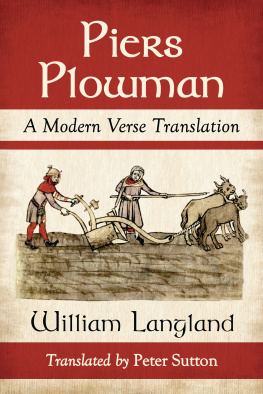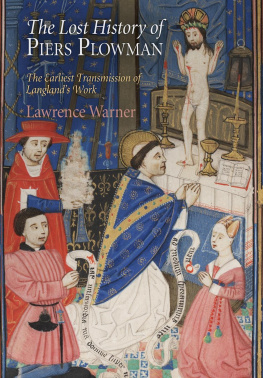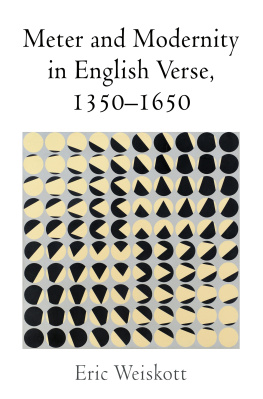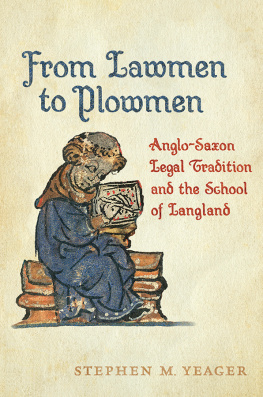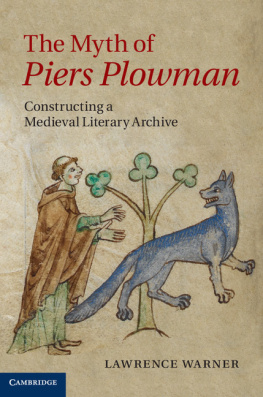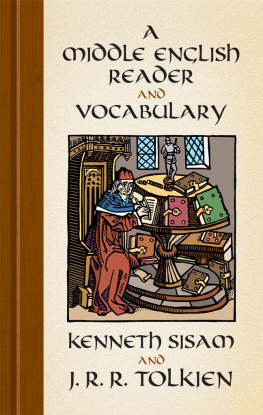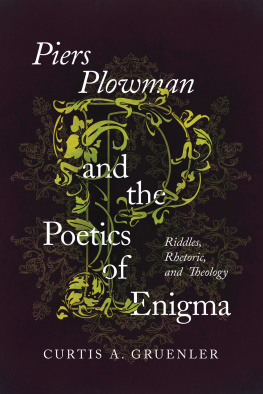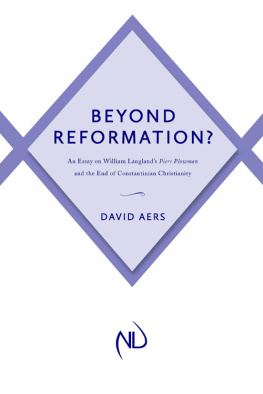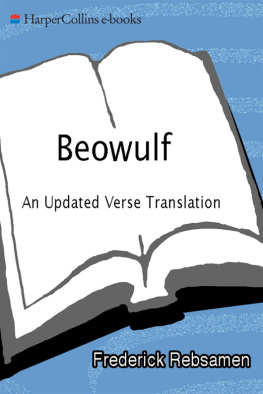
Piers Plowman
A Modern Verse Translation
William Langland
Translated by Peter Sutton

McFarland & Company, Inc., Publishers
Jefferson, North Carolina
LIBRARY OF CONGRESS CATALOGUING DATA ARE AVAILABLE
BRITISH LIBRARY CATALOGUING DATA ARE AVAILABLE
e-ISBN: 978-1-4766-1817-3
2014 Peter Sutton. All rights reserved
No part of this book may be reproduced or transmitted in any form or by any means, electronic or mechanical, including photocopying or recording, or by any information storage and retrieval system, without permission in writing from the publisher.
McFarland & Company, Inc., Publishers
Box 611, Jefferson, North Carolina 28640
www.mcfarlandpub.com
Acknowledgments
I am indebted first of all to Gwen Appleby, who revived my interest in Langland by taking a group of local writers some ten years ago to the precise point on the Malvern Hills where she believed he had his vision. I am equally indebted to Peter Smith, founder and artistic director of the Autumn in Malvern Festival, who subsequently invited me to write about Langland. For their help in that process and in the making of this translation I am grateful to Bromyard and District Local History Society and Local History Centre, Cleobury Mortimer History Society, Colwall Village Society, the Wychwoods Local History Society (Oxfordshire), Herefordshire Archive Service and the Victoria County History Trust for Herefordshire, Shropshire County Archives and Worcestershire Record Office, as well as to the librarians of Great Malvern Library, Westminster Abbey and Worcester Cathedral Libraries. I thank the poet Jim Dening for his kind words about the translation, and my son and my wife, a former proofreader for the European Commission, for their painstaking reading of the text. I owe a debt to all the authors cited in the bibliography, and most especially to Carl Schmidt for his very generous encouragement and permission to consult his work.
Introduction
The Poem and the Translation
The medieval English poem known as Piers Plowman is a moving, disturbing and often amusing commentary on corruption and greed that is still apposite today. Conscience, Fidelity, Gluttony, Pride and the other human strengths and weaknesses named as characters in the poem are timeless, and are recognizable as our present-day politicians and celebrities, friends and neighbors. Merchants, bankers, brewers and judges, scholars, sheriffs, bishops and priests come tumbling out of the text alongside wastrels and vagabonds, thieves and fraudsters, drunkards and whores. The poem gives a vivid insight into the social attitudes and everyday concerns of England in the fourteenth century as well as into contemporary religious beliefs, and it is this mixture of the sublime and the familiar, the coarse and the spiritual, that gives the poem its unique strength.
From the historical references in the poem it is thought that the author, William Langland, wrote the earliest version in the mid1360s, and longer, revised versions in the late 1370s and the mid1380s. This was a period of political and religious upheaval and of burgeoning literary activity, when the French of the Norman elite and the Old English of the Anglo-Saxon lower classes had only recently been melded into one language, now termed Middle English. The best-known English writer of the time is Geoffrey Chaucer, author of works including the Canterbury Tales, although numerous love poems, histories, scientific treatises, plays, songs, romances, moral philosophies, travelogues and religious commentaries were composed and written by other writers too, in both English and Latin.
Piers Plowman revolves around the narrators quest for how to live a good Christian life that combines practical activity with spiritual reflection. Every reading of the poem reveals new layers of meaning, but the English of the text is so far removed from todays language that it cannot be read without assistance. The aim of this translation is to provide a version that retains the energy, alliteration, imagery and intentions of the original and can be read with pleasure for its own sake by anyone interested in poetry, history or literature. It is not intended primarily as a crib, although it can also be used as an introduction to the original, which well rewards deeper study.
The translation grows out of a dramatic presentation about Langland given during the 2012 Autumn in Malvern Festival. I have therefore come at the task not as a literary historian but as a playwright, making use of my earlier experience as a translator working in the fields of education, law and the arts. The work would have been impossible without the background material listed in the Selected Bibliography, although I am aware that I have only skimmed the surface of the vast and richly productive sea of medieval scholarship.
Structure and Synopsis
When the poem was first printed, it was given the overall Latin title Liber de Petro Plowman or Book of Peter the Plowman, and it was divided into two sections, the Vision of Piers the Plowman, and the Life of Do-well, Do-better and Do-best. There is no evidence that Langland intended such a division, but it reflects the difference in mood which occurs at the beginning of Step VIII, when the narrator sets out to discover what doing well means, having seen plenty of ill-doing in his initial dreams. The whole poem can indeed be seen as a journey, each of the 20 chapters that follow the Prologue being called a passus, the Latin for step, which is the term adopted here.
The use of dreams was a conventional literary device,
Despite the many diversions, the narrator does nevertheless progress from puzzlement to resolution, finally moving from contrition and confession and satisfaction through patience and poverty to faith, hope and charity [and] the Cardinal Virtues. The poem closes with a plea for society as a whole to adopt these virtues of prudence, tolerance, justice and fortitude and to follow Christs two great commandments, to love God and to love ones neighbor as oneself.
The poem opens with the narrator falling asleep on the Malvern Hills, a prominent ridge to the west of the River Severn in the English West Midlands, and seeing his first dream of a fair field full of folk caught between heaven and hell. A rowdy wedding is about to take place between Money and Falsehood, but Theology steps in to refer the matter to the King, and the crowd of revelers sets off for Westminster. The King threatens to arrest Falsehood and his friends, who flee, and he asks Conscience to marry Miss Money instead. Conscience refuses, and Reason supports him. The King undertakes to be guided by them in future.
In his next dream, the narrator sees the Seven Deadly Sins make their confession, which incites the people to set out in search of Truth. Piers the honest Plowman offers to lead them once he has finished the harvest, but he has to call up Hunger to punish the carousing idlers who decline to work. The quest for Truth nevertheless leads to a dead end when Piers is offered a written pardon for those who help him. He tears it up, arguing that what matters is not a scrap of parchment but to do well, and preferably to do better or do best.
In the second part of the poem the narrator seeks to discover what this means. In his dreams he consults Thought and Intelligence, Study, Learning and Scripture, but finds their obscurantism frustrating. He idly follows Fortune for a time, but eventually meets Fidelity, Nature, Imagination and Patience, who teach him the merits of poverty and the wonders of creation. He sees further visions of greed and the self-serving nature of social engagement, in the figure of a master tradesman. At length he is relieved to meet his guide Piers again, and encounters Faith, Hope and Charity.
Next page
